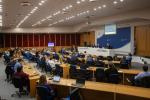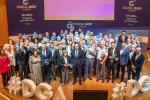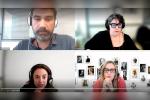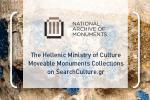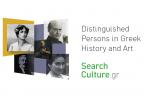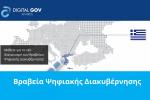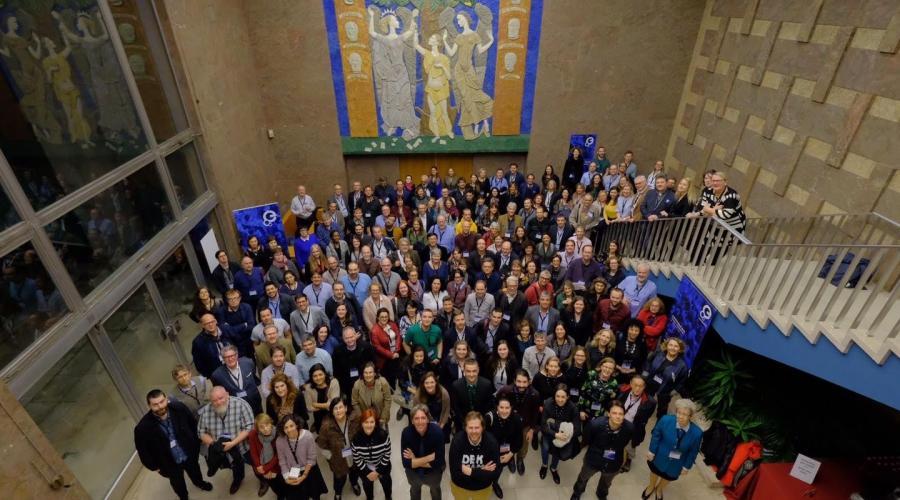
More than 270 people from across Europe - museum curators, programmers, librarians, teachers and representatives of the European Commission - were at this year's conference of Europeana, held at the National Library of Portugal in Lisbon between 27 and 29 November 2019. Participating in this year’s annual meeting of the Europeana Network Association was the National Documentation Centre (EKT) in its role as the accredited National Cultural Heritage Aggregator for Europeana, (SearchCulture.gr)
The Conference, organised by the six communities making up the Europeana Network Association: Tech, Research, Copyright, Impact, Education, Communicators. included workshops and parallel sessions with individual themes. During the three-day conference, there were talks from prestigious members of the broader ecosystem of digital culture and technology convergence.
Workships and parallel sessions
The Europeana Tech community conducted a workshop focusing on the International Image Interoperability Framework (IIIF) for viewing and sharing cultural digital reproductions and how best to digitise and distribute 3D content online. Europeana presented the latest developments in issues such as the relationship of Europeana with the Wikimedia community, emerging artificial intelligence applications in culture, the latest developments concerning the development of enrichment and access to cultural content in multiple languages.
The Research Community organised a seminar exploring the role of Europeana in the Open Science Cloud. It included presentations of projects and infrastructures such as the EOSC Secretariat, the EOSC-hub, the SSHOC project and the infrastructure for digital humanities PARTHENOS. A further session was devoted to the implementation of the FAIR principles (Findable, Accessible, Interoperable, Reusable) by cultural stakeholders.
How teachers can best understand and make use of open content through Europeana's innovative tools and practices was the subject of sessions and workshops organised by the Education Community.
The new EU Copyright Digital Single Market Directive and the possibilities opened up by its adoption by cultural institutions and the importance of the involvement of cultural stakeholders in bringing the Directive into national law by June 2021 was the main issue that the Copyright community considered during the workshops and sessions it moderated.
The community involved in developing the methodology for impact measurement in collaboration with the Communicators community held a workshop on how employees in cultural institutions can leverage relevant authorities to better communicate the value of their work not only to users but also decision-making authorities and funders.
In an open-discussion, European Commission representatives and participants considered what digital transformation means to cultural institutions, what measures should be taken at European and national levels, and how it can help Europeana to accelerate related developments.
A major consideration of the conference was the role of cultural actors and their social responsibility in the increasingly complex environment in which they operate. Climate change, equal conditions for participation in the Europeana Network Association- regardless of country of origin, gender, religious beliefs, hierarchy- fake news, the role of artificial intelligence and algorithms in the way cultural information is used are issues of concern for cultural institutions and affect the way they now operate. It is worth noting that one of the key initiatives taken by the Chief Council of the Europeana Network Association was for this year's conference to make as small an environmental footprint as possible. In this context, over 75% of the food was vegetarian, there were no printed publications and Europeana covered the carbon charges for flights.
EKT- National Cultural Heritage Aggregator for Europeana
EKT has gathered 500,000 digital cultural items from 59 Greek cultural institutions and, through its SearchCulture.gr platform and in its role as the accredited national cultural heritage aggregator for Europeana, contributed more than 320,000 of those collected items to Europeana (43 collections). Actors with content in SearchCulture.gr can simultaneously join the European Digital Library Europeana, which brings together more than 50 million records and gives users the chance to search diverse collections of museums, archives and libraries of Europe.









